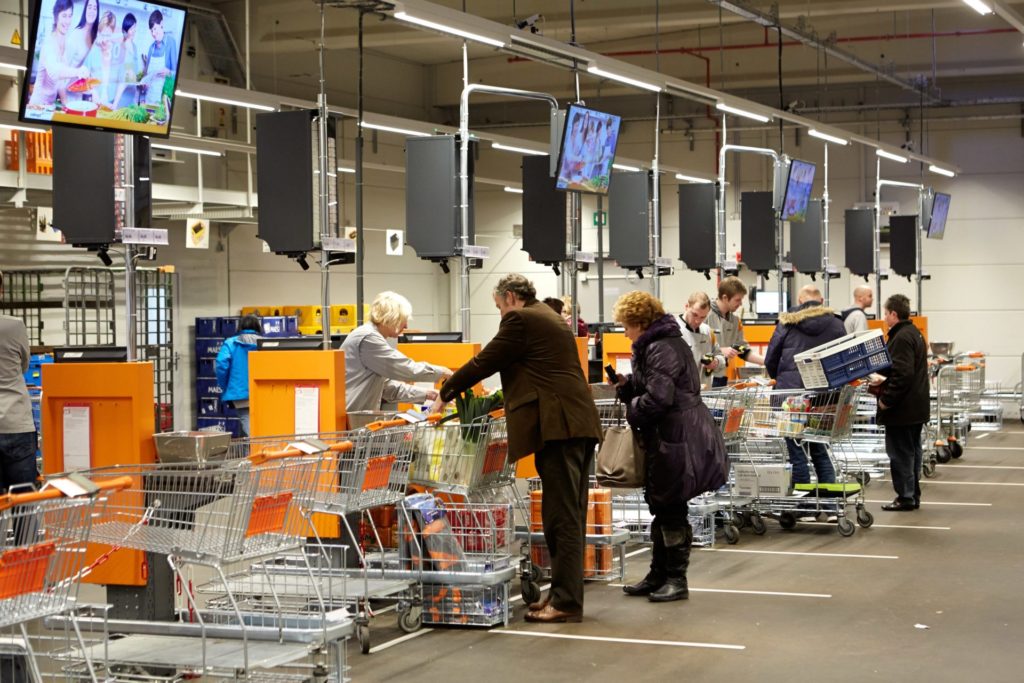Flemish supermarket giant Colruyt is petitioning the Federal Government to review the remuneration of employees in the Belgian supermarket sector, L’Écho reports. The company claims that there are currently unfair differences in the pay between so-called “integrated” and franchise-run stores.
The demand follows weeks of protests by Delhaize supermarket employees over a corporate decision to shift its 128 directly controlled integrated stores to franchises. The decision means that employees will likely receive less compensation, due to existing wage schemes set out by the Federal Government.
In a letter sent by the Colruyt Group to Federal Minister of Labour, Pierre-Yves Dermagne, the supermarket chain calls for reforms to the supermarket sector, notably for a simplification in the joint committees system.
These committees, trade unions and employees set the wages and working conditions for a given sector. Currently, there are five joint committees which represent the Belgian retail sector. Under current legislation, stores operating franchises must pay their staff less than those directly controlled by companies.
Correcting inequalities
Colruyt characterises this as a “historical imbalance” that it wants to “correct”. It stops short of calling for the government to get rid of the distinction between the two types of stores, as is currently being advocated for by some striking employees, but it advocates for closing the gap between the two models.
“The main goal is to achieve a fair competitive landscape in terms of wages and working conditions, where there is room for both,” the letter from Colruyt reads. The current system, the supermarket argues, can create unfair competition and even abuses in the labour market.
“Today, companies can organise themselves in such a way that they come under the umbrella of CP 201, the joint commission for very small independents, and divide themselves into smaller entities, even if they are essentially several shops operated by a single entrepreneur,” they argue.
The supermarket chain says that, while they claim the benefits of acting as a smaller enterprise, they in effect operate the same as a larger company. “This situation is detrimental to the truly small independents: the baker, the butcher, the small independent retailer, but also to the integrated chains.”
Unfair advantage
Colruyt is not one to point fingers, but it is common knowledge that franchise operators of several Carrefour and Albert Heijn locations benefit from the CP 201 status, operating their stores as separate small companies.
While working conditions at Colruyt are typically assessed more positively than at other supermarket locations, with all of its 249 stores working under an integrated model, the brand itself is not immune to accusations of labour injustices. During the Covid-19 pandemic, staff at several of its stores went on strike over pay and working conditions.
The supermarket frames its appeal to the Federal Government within the context of social equality. Notably, it claims that the differences between the two operating models, franchise and integrated, exacerbate social inequalities.
“Employees with the same function and tasks in a supermarket earn up to 400 less per month when they belong to the joining commissions 201, and not 202 (the CP for integrated stores). The difference amounts to 5,000 per year. This is hardly justified,” the family-run supermarket said.
Related News
- Hundreds of protestors gather outside Delhaize headquarters after failed talks
- Delhaize strikes: Belgium's Labour Minister appoints mediator to reconcile parties
Ultimately, Colruyt aims to interject in the ongoing, and so far fruitless, discussion between unions, the government, and Delhaize over the ongoing blockage of locations of stores, particularly in Brussels. To adjust the joint commissions, both unions and the Federal Government would need to work together.
Naturally, there is a vested interest in Colruyt’s advocacy for changes to the joint committees. Delhaize and Albert Heijn’s decision to switch to a cheaper franchisee model significantly weakens Colruyt’s market position.
Nevertheless, in the context of equality, the company stresses the urgency of its appeal. “If no adjustments are made to the system, the integrated trade model risks disappearing in the long term,” it warned.

